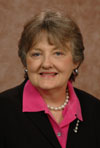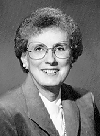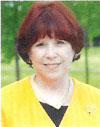Women in nursing contribute to
communities
The following article is the
first in a series dedicated to Women’s History month and the national
theme, “Women: Builders of Communities and Dreams” featured in The
Catalyst throughout March.by Heather Woolwine
Public Relations
The story of women in our culture resonates as a journey through time and trial for equality, individual freedom, and hope. Hope rests close to the heart of health care; it is a belief in powerful healing, and hope for a better community that encourages so many women and men alike to better the places in which they live through health care.
March is National Women’s History Month, and according to the National Women’s History Project’s Web site, it should focus attention not on the idealization of women, but instead an appreciation for the complex and sometimes contradictory view of living a full and purposeful life that women so often accomplish.
Those in nursing offer a distinct and interesting view concerning the contributions of women to health care in the past and where women will go in the future. Born to nurture and raise our young, for centuries women translated that power into helping and nurturing any community or cause in need. Through the eyes of some of the MUSC College of Nursing’s veterans of community building, unique viewpoints blend to form a harmonious view of achieving dreams through building the health and wellness of communities.
A need to serve
Undoubtedly, most people enter nursing with that undeniable urge to care for another human being. But it takes a special kind of nurse to push that desire into a greater urge, something that will benefit a community now and in the future. Deborah Williamson, DHA, knows all about the urge.
A certified nurse midwife with a private practice here in Charleston in addition to her CON professorship, Williamson dove into a health care career with the mindset of bettering the community.
“I never saw myself as a hospital nurse,” she said. “I’ve always been interested in working with the community. Some of the women throughout history that I admired most were nurses who through community engagement were able to enact change; they assisted immigrants through health and literacy programs at settlement houses in the northeast, engaged in political activity to end sweatshops in this country, introduced family planning and promoted contraceptive options, and participated in women’s suffrage. When I was at Duke University, I heard Dr. Jack Geiger talk about lessons learned from trying to provide health care in rural Mississippi. He pointed out that people can’t focus on health care as long as they’re worried about housing, food, or basic survival. His talk crystallized for me the role I wanted to play in health care; I wanted to be involved in creating systems of care that would benefit an entire community.”
Williamson chose nurse midwifery as the clinical path that would involve her in the lives of families and their communities. She practiced in rural and urban settings in Utah and Colorado before moving to Charleston.
Once in the Holy City, Williamson’s interest blossomed into not one, but two grants from the Duke Endowment Fund and one from Health Resources and Services Administration enabling the placement of nurse midwifery services in both McClellanville and John’s Island tied to MUSC affiliated practices. The goals of the three grants were “to provide seamless care to pregnant women and their families through partnerships with a variety of organizations dedicated to promoting healthy lifestyles,” she said. By maximizing collaborative efforts, increased resources became available to all communities.
Williamson encouraged students to become involved with community efforts while still in school and explained that students must get out of the house and off campus if they really want to understand community health needs.
 Dr. Carolyn Jenkins
Dr. Carolyn JenkinsCarolyn Jenkins, Dr.PH, R.N., CON professor and REACH 2010 principal investigator, has also felt the magnetic pull to community-based nursing. With the belief that health disparities did indeed exist and that people with no health care access because of lack of insurance received less care, Jenkins began REACH 2010. REACH 2010 is designed to help blacks with diabetes receive quality care and reduce disparities. Through community partnerships, interdisciplinary collaboration, and MUSC student involvement, REACH 2010 provides diabetes education and prevention. It also links people with screenings and care while removing the blockage and barriers to quality health care for people with a low-income background throughout Charleston and Georgetown counties.
“Since the program began in 1999, we’ve seen a 50 percent reduction in diabetes-related amputations for African-American men in Charleston County,” Jenkins said. “We’ve eliminated the disparities in diabetes care and the data from the last couple of years shows that diabetes care is now no different for those with or without health insurance in our county. Also, in 1999, only 10 percent of African-Americans with diabetes were tested for early signs of kidney disease, and now 50 percent are. Eye exams went from 30 percent to 60 percent and diabetes teaching went from 40 to 90 percent.”
Jenkins relishes the success of the program, but was quick to add that the work is not completed. She mentioned several other areas that need attention for this particular community, including more attention to healthy eating and physical activity, along with heart disease and stroke prevention. Jenkins maintained her faith in the program, “Each individual brings special skills and through collaboration and hard work changes will come about. We need women, we need men; we need African-Americans and representation from all ethnic and racial groups to serve all the communities that need help. While it’s certainly not the case at the moment, we need our health care professionals to represent the population demographics we serve.”
Knowing how and when to reach out
“We have to realize that we’re all going to make mistakes along the way, but you can’t ever give up when you’re trying to help the community,” Jenkins said. “You face them, work through them and continue learning.”
So while it may be there is no perfect time or place to become involved with the community, maybe that’s not the real question. Instead, the question might be how to find the right cause for the right individual.
Williamson offered advice to students on how to become involved in community activities. First, she recommended identifying organizations with a philosophy or purpose consistent with a student’s values. Within that group, seek role models and mentors who would nourish a student’s drive and determination to help a community in need.
“We all have a civil responsibility to make a difference and the world a better place,” Jenkins said. “And it’s our responsibility to help students develop that civic responsibility through programs and activities that not only develop this conscience, but that also introduce them to role models and engage them in service learning. Learning while performing a specific service for a community is a perfect opportunity to learn necessary skills and reflect upon what the experience means for the future of that person’s professional career.”
Another veteran of community-based nursing and a nurse midwife herself, Elizabeth Bear, Ph.D., CON professor emeritus, cited the work of the MUSC Presidential Scholars student group as a prime example of how to become involved. “Any time that students can go out into the community and serve as ambassadors for MUSC as well as the College of Nursing, it’s a positive thing,” she said. “It has that public health nursing element where you’re out in the community, they know you and trust you and you’re there to maintain their healthy family and community. We’re returning to those roots in nursing, but in a new way.”
 Dr. Elizabeth Bear
Dr. Elizabeth BearBear’s role as an oral historian led her to conduct significant historical research, including an oral history of prominent social anthropologist Esther Lucile Brown and her contribution to nursing education. She’s also collecting historical data on South Carolina midwives, including famed black nurse-midwife Maude Callen. In fact, Bear’s work is currently on display in the Smithsonian’s Anacostia Museum and Center for African American History and Culture. The exhibition entitled, “Reclaiming Midwives: Pillars of Community Support,” explores the history of black midwives from the days of slavery to the mid-20th century and will be on display until August.
Committed to community
“I believe that our college excels in reaching out to the community and helping people build dreams. If you look at our grants portfolio you will see that so many of our clinical grants, teaching grants and research grants are community-based and involve establishing partnerships, learning collaboratively and working to improve the quality of life of our communities,” said Gail Stuart, Ph.D., CON dean.
It’s through this continued commitment to collaboration and a newfound drive for research based practice that propels the college and its community efforts forward.
“Historically, women and nurses are both seen as nurturing people, and I see that continuing, but I also see a role for men,” Jenkins said. “Many men are just as nurturing and men have a place in nursing. Nurses are truly well-suited to make a difference in health care because of our close link to the patient, and our commitment to continually develop the art and science of nursing.”
Research will also factor more heavily into the nursing world as years come and go. Already, the CON stands poised to take the health care field by storm with its numerous awards, grants, and innovative approaches to community health care problems. Jenkins added, “We all have unique contributions to make in terms of research and can learn from one another in different disciplines. Much nursing research growth will consist of, I think, managing chronic illness, disease prevention, and how to truly partner with other members of the healthcare team.”
Williamson believes that “by continuing to create clerkships and programs like the Presidential Scholars program that go out into the community, we’re showing all students, most of whom are from homogenous, middle class backgrounds, that there’s a different reality for our patients. Through these activities, we broaden the student’s perspective, promote more sensitive and caring providers, and create the potential for more varied approaches to solving health care problems.”
Bear echoed some of the same sentiments, and felt that it is nursing’s time as a profession to become independent practitioners all the way around. “We’re at a terrible crossroads in terms of shortage and our ability to prepare faculty as fast as we need them,” she said. “We’ll need a balance of men and women who are clinically and technologically competent who realize that nursing is an honorable and exciting career, especially when it involves the community.”
“I believe that nurses do bring unique insights and skills to community work, largely because this work embodies the essential elements of nursing practice. Such practice is not dependent on gender, either male or female, but rather derives from a nursing model of practice,” Stuart said. “Unfortunately, this work is often not as visibly dramatic as life-saving surgery or mesmerizing as technology. But it is equally and perhaps even more important that nurses continue to combine the high tech of health care with the high touch of community education and empowerment. I am proud of the contributions our faculty and students make to this effort and realize that we can always do more. With each interaction with patients, families and communities we gain insights into their world, their experiences, their needs and their desires. Listening, advocating and acting are the interventions we teach our students, as we believe that they are the active ingredients of health, healing and community resilience.”
To Community and Beyond
Susan Benedict, DSN, R.N, College of Nursing professor, took caring for a community to an international level when she began traveling to India. Susan Benedict
Susan Benedict“For the past three years, I’ve taken students to work in a clinic for Dalits (untouchables) in rural India. Last year, our trip was shortly after the Tsunami and certainly linked the community of Charleston to the people of the state of Tamil Nadu through the generosity of those in our area who contributed money and supplies to be taken to India,” she said.
Benedict’s relationship with St. Mary’s Health Center, located in the village of Odihiyathur, developed throughout this time into one of true international outreach, including the relief effort she mentioned. Of course, balancing a professorship and nursing career in South Carolina, a family life, and international relationship with the Dalits in India requires determination and a need to help and understand communities different from her own.
“I think that by setting examples and offering opportunities to students, especially unusual opportunities, we can better prepare students to become active participants in various communities,” she said. “And one need not limit oneself to a local community. Perhaps one can become a helpful member of a distant community. The Dalit community of southern India has few grand dreams. Many just want to get through a day with enough for their children to eat. When thinking of the future, they find joy in their children and pray that they will have a less difficult life and one with more opportunities. I think the Dalit women are the strength of the community. They must raise children, work in rice fields or stone quarries, and care for the animals that provide nourishment for the family. They are the souls of patience and strength and I am inspired by them every time I visit.”
Friday, March 10, 2006
Catalyst Online is published weekly,
updated
as needed and improved from time to time by the MUSC Office of Public
Relations
for the faculty, employees and students of the Medical University of
South
Carolina. Catalyst Online editor, Kim Draughn, can be reached at
792-4107
or by email, catalyst@musc.edu. Editorial copy can be submitted to
Catalyst
Online and to The Catalyst in print by fax, 792-6723, or by email to
catalyst@musc.edu. To place an ad in The Catalyst hardcopy, call Island
papers at 849-1778, ext. 201.